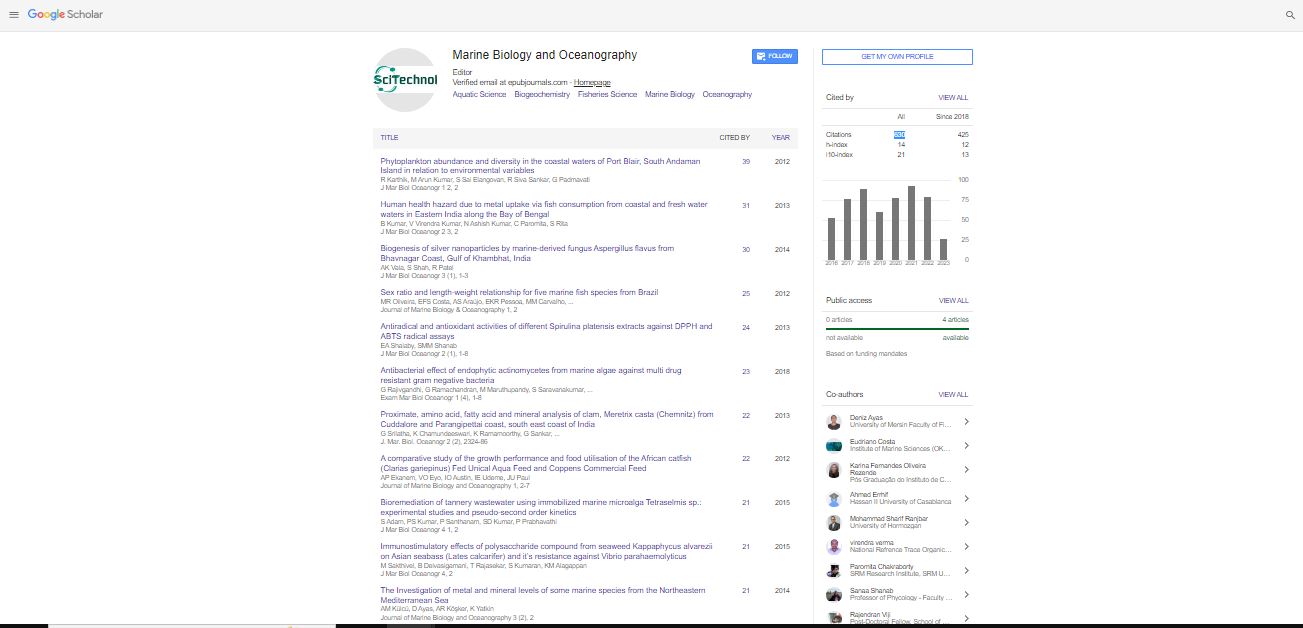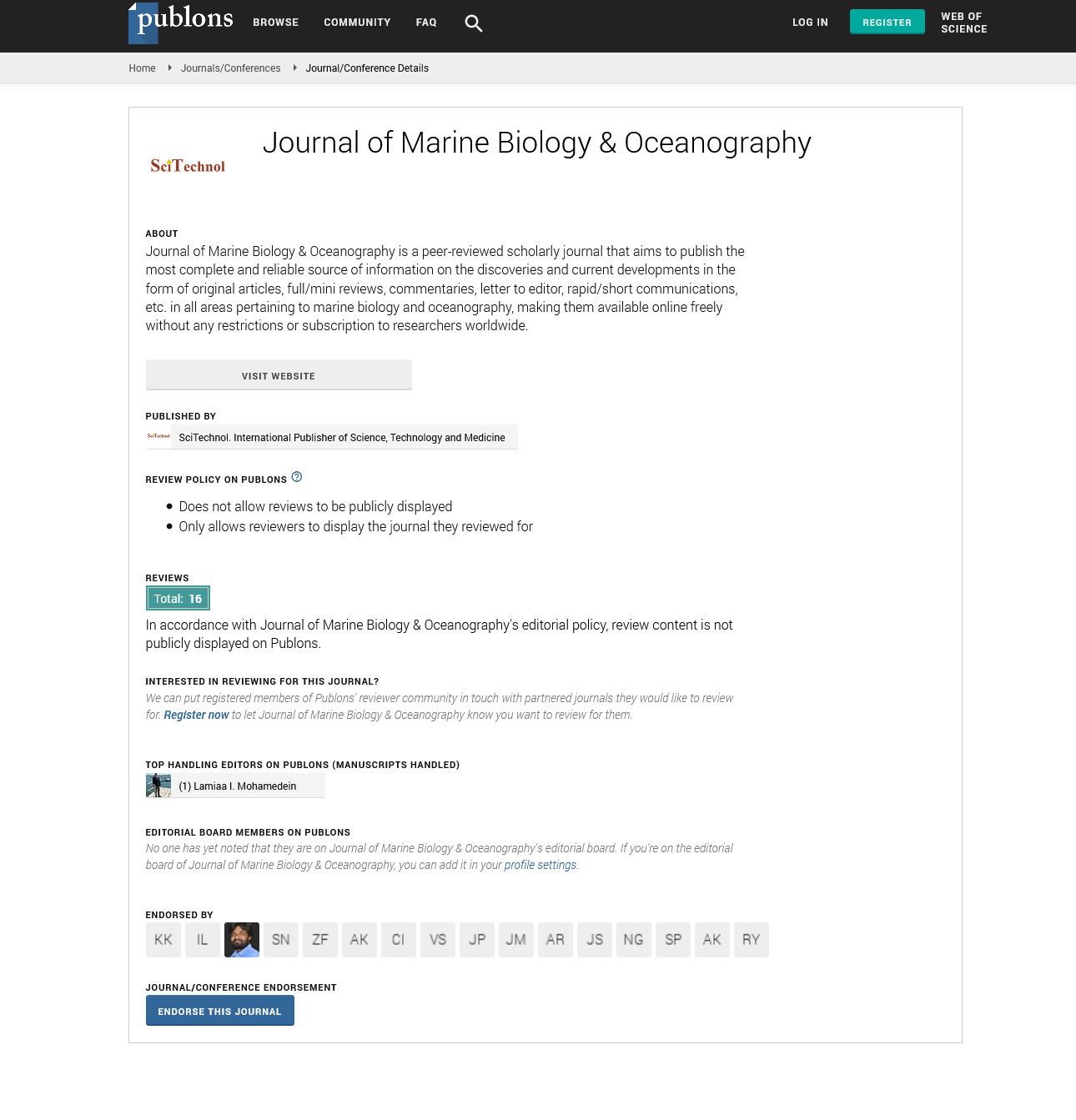Short Communication, J Mar Biol Oceanogr Vol: 12 Issue: 5
Assessing the Potential of Marine Organisms: Impact on Ocean Life
Chae Xiang*
1Department of Ecology and Environment, Hainan University, Haikou, China
*Corresponding Author: Chae Xiang,
Department of Ecology and Environment,
Hainan University, Haikou, China
E-mail: chae_xianghu22.cn
Received date: 20 September, 2023, Manuscript No. JMBO-23-121774;
Editor assigned date: 22 September, 2023, PreQC No. JMBO-23-121774 (PQ);
Reviewed date: 06 October, 2023, QC No. JMBO-23-121774;
Revised date: 13 October, 2023, Manuscript No. JMBO-23-121774 (R);
Published date: 20 October, 2023, DOI: 10.4172/2324-8661.1000286
Citation: Xiang C (2023) Assessing the Potential of Marine Organisms: Impact on Ocean Life. J Mar Biol Oceanogr 12:5.
Description
The oceans, covering over 70% of the Earth's surface, harbor a stunning diversity of life that extends from the sunlit shallows to the enigmatic depths. Within this aquatic realm, marine organisms play pivotal roles in shaping the ecosystem dynamics and influencing the very fabric of ocean life [1]. The oceans host a vast assortment of creatures, including an astounding variety of invertebrates like corals, sponges, molluscs, and crustaceans. Their diversity showcases a range of colours, shapes, and ecological roles, contributing to the intricate balance of marine life [2].
Marine organisms encompass a vast array of life forms, ranging from microscopic plankton to the majestic creatures inhabiting the ocean depths. From vibrant corals to elusive deep-sea creatures, each species contributes uniquely to the biodiversity and balance of oceanic ecosystems. Certain marine organisms serve as keystone species, wielding a disproportionate influence on their surroundings [3]. For instance, coral reefs, built by tiny coral polyps, form complex ecosystems that harbor a staggering diversity of marine life, supporting countless species and protecting coastlines from erosion.
The biochemical richness within marine organisms presents an invaluable resource for scientific exploration. These organisms produce a myriad of compounds with pharmaceutical, industrial, and agricultural potential, offering promising leads for drug development, biomaterials, and biotechnological innovations [4]. Marine organisms exhibit remarkable adaptability to the ocean's ever-changing conditions. Their unique adaptations, such as bioluminescence, thermal tolerance, and chemical defenses, not only ensure their survival but also contribute to the resilience of marine ecosystems.
Marine organisms provide indispensable ecological services, including carbon sequestration, nutrient cycling, and maintaining global climate regulation. Moreover, their economic value extends beyond fisheries, encompassing ecotourism, bioprospecting, and potential future industries [5]. Marine organisms produce an extensive array of bioactive compounds with significant industrial, pharmaceutical, and agricultural applications. These compounds serve as sources for drug discovery, biomaterials, and innovative biotechnological advancements [6]. Marine organisms contribute to the culinary world and nutrition through their biochemical diversity. Omega-3 fatty acids sourced from fish and algae, for instance, provide health benefits, while compounds from certain seaweeds add flavour and nutritional value to foods.
Marine-derived compounds showcase potential in environmental applications, aiding in pollution control and bioremediation efforts [7]. Enzymes and biomolecules from marine organisms contribute to the degradation of pollutants, reducing environmental hazards. Despite the vast potential of marine biochemicals, challenges persist in harnessing and utilizing these compounds effectively. Challenges include sustainable sourcing, efficient extraction methods, and scaling up production for commercial applications [8]. Human-induced stressors, including overfishing, habitat degradation, pollution, and climate change, threaten the stability of marine ecosystems. Conservation efforts, marine protected areas, and sustainable practices are essential in safeguarding marine biodiversity [9].
Human activities, ranging from overfishing to pollution and climate change, exert considerable pressure on marine organisms and their habitats. Conservation initiatives, marine protected areas, and sustainable practices are essential in preserving the delicate balance of ocean life and safeguarding these invaluable resources. Studies in science keeps revealing the incredible potential of marine species [10,11]. Advances in biotechnology, genomics, and ecological studies pave the way for innovative discoveries and applications, providing insights into marine biodiversity and its untapped benefits.
Conclusion
The ocean's complex web of life is held together by the immense potential of marine species, which provide chances for sustainable coexistence, ecological preservation, and advances in science. Recognizing and safeguarding the significance of these organisms in maintaining the health and balance of the oceans is pivotal in promoting a harmonious relationship between humanity and the vast, biodiverse realm beneath the waves.
References
- Jaroslav Albert (2016) “A Hybrid of the Chemical Master Equation and the Gillespie Algorithm for Albert J. A hybrid of the chemical master equation and the Gillespie algorithm for efficient stochastic simulations of sub-networks. PloS one 11(3):e0149909.
- Cushing DH (1969) The regularity of the spawning season of some fishes. ICES J Mar Sci 33(1):81-92.
- Durant JM, Hjermann DØ, Ottersen G, Stenseth NC (2007) Climate and the match or mismatch between predator requirements and resource availability. Clim Res 33(3):271-283.
- Lotka AJ (1920) Analytical note on certain rhythmic relations in organic systems. Roc Natl Acad Sci 6(7):410-415.
- Von Bertalanffy L (1950) The theory of open systems in physics and biology. Science. 111(2872):23-29.
- Pianka ER (1970) On r-and K-selection. Am Nat. 104(940):592-597.
- Wangersky PJ (1978) Lotka-Volterra population models. Annu Rev Ecol Syst 9(1):189-218.
- Zwanenburg KC, Bowen D, Bundy A, Frank K, Drinkwater K, et al. (2002) 4 Decadal changes in the Scotian Shelf large marine ecosystem. LMEs 10:105-150.
- Choi JS, Frank KT, Petrie BD Leggett WC (2005) “Integrated assessment of a large marine ecosystem: a case study of the devolution of the eastern Scotian Shelf, Canada”. Oceanogr. Mar. Biol Ann Rev 43:47–67.
- Comeau M, Conan GY (1992) Morphometry and gonad maturity of male snow crab, Chionoecetes opilio. Can J Fish Aquat Sci. 49(12):2460-2468.
- Quinn TJ (2003) Ruminations on the development and future of population dynamics models in fisheries. Nat Resour 16(4):341-392.
 Spanish
Spanish  Chinese
Chinese  Russian
Russian  German
German  French
French  Japanese
Japanese  Portuguese
Portuguese  Hindi
Hindi 
